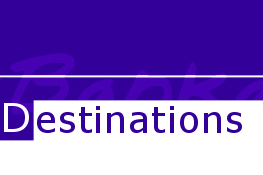


 |
 |
 |
 |
|
|
California, That Old and New Enchantment By Achilles B. Mina
|
|||||||||
|
It’s
the United States’ most famous state and, next to its iconic district of
movie stars, the world’s most recognizable place name. Anyone but anyone
today in any town or village in the world with access to TV or a movie
house will recognize its name, given such prominent anthropomorphic
landmarks as Mel Gibson and Arnold Schwarzenegger and endorsements like
Disneyland and E! Stretching 1,400 kilometers from north to south and 300
kilometers from beach sand in the west to desert sand in the east,
California spans continents with its hegemony in pop culture and, over
diverse social landscapes, spawns the stuff that modern dreams are made
of. California, of course, is more than just Hollywood, although the state, like a night sky without stars, will be much diminished without it. Located on and dominating the western seaboard of the United States, it offers the visitor, if nothing else, a breathtaking road show of changing geological backdrops, often with memorable subplots of adversarial climates and sensual scenery. In California, being in the city means being near a beach, a redwood forest, a desert, or a snowcapped mountain. |
||||||||
Northward, the Pacific waters lose some of their tropical warmth and the beaches give up their golden sand. In return, it seems, the land gains more character, becoming more rugged and picturesque with coastal mountains, rocky cliffs and secluded beaches. Hiking and sightseeing replace surfing and swimming as major tourist preoccupations; seals and whales gain top billing at the expense of movie stars and beach babes. In beautiful country, it’s no contest really. The Coastal Mountains are actually ancient volcanic ridges that run almost the entire length of the state, providing travelers with stunning views of the winding coastline and the sea, many immortalized at one time or another, no doubt, in Hollywood celluloid. But the sublime wild beauty of the Big Sur, that legendary stretch on Highway One, 500 kilometers north of Los Angeles and 250 kilometers south of San Francisco, remains to this day impossible to contain on film or print. |
|
||||||||
The mountains are uniformly low but they advance or retreat from the coastline irregularly. In places where they cozy right up to the coast, they form spectacular cliff drops like those found along the Big Sur. In places where they move back many kilometers from the coast, they give rise to cities like Los Angeles, San Diego and San Francisco. |
 |
||||||||
|
Six hundred forty kilometers north of Los Angeles lies California’s other great city, San Francisco. Cooler, gentler and more steeped in the romance of adventure than its southern cousin, the City by the Bay has captured the hearts of artists and adventurers through the years. Founded in 1776 in the shadow of the San Dolores mission and built over time to accommodate whalers, seafarers, gold prospectors and traders, San Francisco today retains much of its magical allure because it still possesses its amalgam of scenic setting, mild climate and romantic spirit. The city commands a panoramic view of the expansive and beautiful San Francisco Bay, inspiration to many a painting and song. Victorian houses still line its steep streets and they, in turn, still host the cable car, once an important means of transportation, now an inviolable link to old enchantment. Eastward, over the Coastal Mountains, beach gives way to the orchards and vineyards of the Central Valley, a fertile land redeemed from desert by modern irrigation. Some of the best wines come from this region, although the best high-quality vintages are produced in Napa and Sonoma, both just a few dozen kilometers north of San Francisco. Two hundred kilometers farther east waits theYosemite National Park. It’s home to an ancient stand of giant sequoia trees, to one of the world’s most picture-perfect alpine valleys, and to the nine towering waterfalls that decant into the valley. The whole park holds 3,100 square kilometers of wilderness but just 320 kilometers of paved road. In keeping with its character and charter, the rest of the natural estate is laced with 1,200 kilometers of hiking trails. Here, California sheds its cosmopolitan trappings and comes full circle to how it was before the first Spanish missionaries arrived. Expect bear, deer, puma and coyote. |
||||||||
|
|||||||||
| When in California, you can use your Bankard MasterCard, Bankard Visa or Bankard JCB. | |||||||||
 |
||